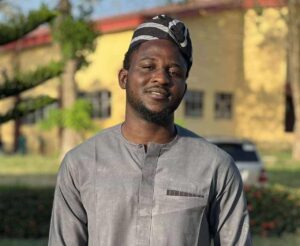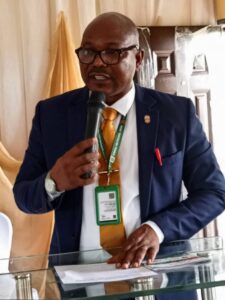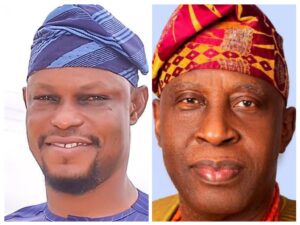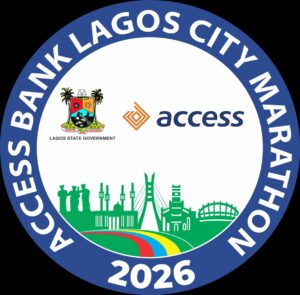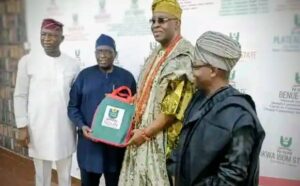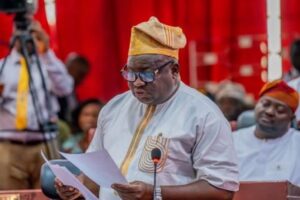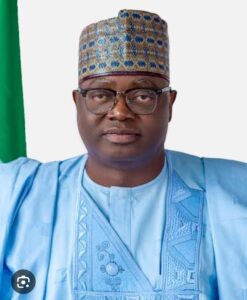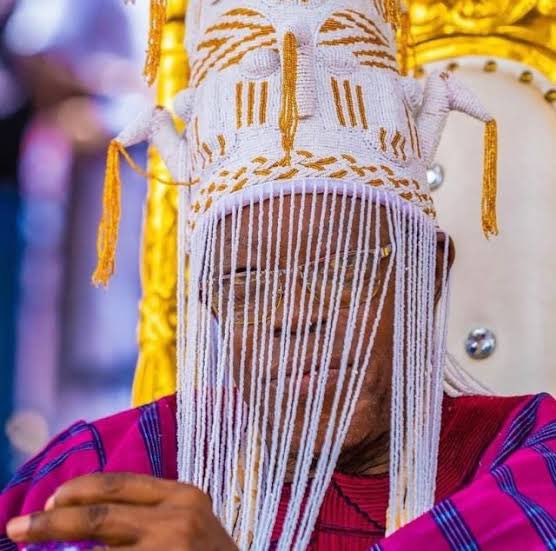
By Wole ADEJUMO
As I was ushered into his expansive Alarere compound that Saturday morning, I was told to exercise patience as Baba would soon come downstairs. I was quick to notice that where I was told to sit was where he would hold court.
A large portrait rested against the wall behind the table that faced where I sat.
The Akoko leaves on his cap was an indication that the picture was taken on his elevation to a new position and that much was confirmed by the congratulatory message on it. There were smaller pictures of him with other chiefs, each telling a different story.
While studying my immediate environment, ideas started coming for the intro of the interview I came for. Of course I was not the only one waiting; people came for different reasons. Political followers, extended family members and even those who came to seek help were all there.
A slim, dark skinned woman seemed to be the most vocal member of the political class. She reminded the others about a particular rally where a fight almost broke out but she doused the tension with her song, “ẹ ma jẹ ka ja o, ẹ ma jẹ ka ja o, ohun to wa nilẹ o to pin, ẹ ma jẹ ka ja” (don’t let us fight, don’t let us fight what is on ground is enough to go round, don’t let us fight).
As High Chief Lekan Balogun (as he then was) emerged from the main building, all rose to greet him. On sighting me, he asked to be allowed to attend to his people first since I would take more time. By the time it was my turn, we had barely spoken for a minute when he got a trajectory-changing telephone call. He told me there had been some trouble in the family compound leading to the arrest of some young men. He therefore needed to proceed, as a matter of urgency to the Police Area Command at Iyaganku.
Then came the questions, “so, Adejumọ, do we reschedule? Where are you going when you leave here?” I said I was going to Ring Road and when he heard that I didn’t come in my car, he asked me to ride with him in his white Toyota Sequoia. Seeing the low-hanging fruit the ride presented, I asked if we could commence the interview.
When I asked about his continued involvement in politics despite a rule by the then Olubadan, Oba Odulana Odugade that members of the Olubadan-in-Council should steer clear of partisan politics, he smiled and said, “You see, that rule was not for everybody but for politicians who went about with thugs, exhibiting their nuisance values all over the city. It was because of politicians harboring miscreants that kabiyesi made that proclamation. So, it is not that we should not take part in politics but that we should be peaceful about it”. He did not fail to acknowledge Oba Odugade’s tour de force in instilling discipline and ensuring that peace reigned.
Those who have interacted with Oba (Senator) Balogun Allí Okunmade II would readily attest not just to his eloquence but his intellect. It was obvious he had read all there is to read on some matters and he usually quoted famously from the likes of Karl Marx and Chairman Mao among many others.
His unctuous sense of humour is what many would miss. In the heat of the brouhaha that trailed the murder of a former transport union Chairman, he addressed a press conference in his house and in the interaction that followed the media parley, he singled out City People’s Dare Adeniran asking whether he knew what Eruwa, the name of his hometown connoted. Journalist and Public Affairs Analyst, Bisi Oladele tóo spoke of Kabiyesi’s avid sense of humour on air recently.
Though save, urbane and sophisticated, whenever it was time to lead from the front, Okunmade II was never found wanting. As a politician and family head, he priortized the welfare of his followers. And once he believed in a cause, he would defend it with everything he had. We once asked how he knew a former Senate Leader was innocent of the allegations brought against him during the “Eléwé Omo” saga and he delved into conspiracy theories. “Sometimes people kill their friends so that their enemies could get punished for it”, he averred.
A true Alli Iwo son and archetype of the Ibadan warriors of the days of yore, Oba Balogun would not hesitate to defend himself and followers from danger. His residence once came under attack from gun wielding suspected political thugs. It was shortly after this incident that I visited and as we left Alarere, I noticed private bodyguards. Seeing my bemusement, he explained that he had written to the Commissioner of Police, but if the police was not going to protect him, he would take no chances.
Another encounter I had with him was when he held sway as the leader of the kingmakers during the installation process of his predecessor, Oba Saliu Adetunji. The Seriki issue had reared it’s head again and a chief had gone to court to stall the installation. At the press conference held at Mapo Hall, I asked what situation the Seriki line was in and the answer High Chief Balogun (as he then was) gave shaped the narrative. Making the chief’s case look like an irresponsible quest, he made it known that as at that time, Ibadan had no Seriki. “The last Seriki we knew was High Chief Augustus Adisa Akinloyè and he died years ago, so there is no Seriki line”, he affirmed.
With Olubadan Alli Okunmade’s transition, Ibadan has lost a gem. The marks he left will however be spoken of for a long time to come. With his status as the first PhD holder to rule the ancient town, he joins the pantheon of record breaking Ibadan monarchs; he joins the likes of Oluyedun (son of Afonja of Ilorin) who first used the Kakanfo title in Ibadan, Iba Oluyole, the first to simultaneously rule Ibadan while holding the title of Baṣorun of Ọyọ, Baalẹ Shittu (son of Aare Latoosa) who became the first son of a past ruler to ascend the throne, Baale Fijabi II, the first Ibadan monarch born in the town, Oba Okunola Abaasi Aleshinloye, the first to bear the Olubadan title and Oba Daniel Tayo Akinbiyi, the first to wear a beaded crown from the day of his coronation.
With the vacant throne, the opprobrium that trailed the movement of palace drummers to the home of the Olubadan designate, Balogun Olakuleyin is quite understandable since it is mostly from non-indigenes. Quite unknown to many, the Ibadan obaship system is a portmanteau of tranquility, order, capacity building and unpretentious loyalty to the city.
It is a transparent system in which the next monarch is already known. As such, while one family is mourning the departed, the next in line is celebrating a feat that has eluded many families. That explains the term “ọmọ Agbotikuyo” (children of those who rejoice on hearing news of death) often rendered among praise names of Ibadan. It is so decisively upright that no Olubadan will ever have to await a court verdict to validate his obaship.
And who says it is not worth rejoicing over? The journey to the throne commences when one becomes the Mogaji (family head) of his compound and for those who eventually make it to the top, the process takes about four decades. There have been talks about Ibadan being ruled only by old men but true to the words of Oba Adetunji Aje Ògúngúniso, “the Olúbàdàn throne is never contested for and only those who live long can ascend it”.
So, what our monarchs seem to lack in physical strength, they have in native wisdom and significant experience having become family heads at much younger ages.
Thanks to the significantly credible monarchical arrangement, as Ibadan bids the scion of Ali Iwo Jogioro Apewaajoye farewell, it is ready to welcome Oba Owolabi Olakuleyin.
…Adejumo sent this piece from Ibadan.

